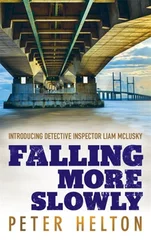He yawned as he took off his shoes and jacket. He continued into the bathroom and took a pill from a blister pack of Imovane—a sleep aid—and swallowed it with a sip of water. Then he popped another sedative, Sobril, into his mouth and pushed it far back on his tongue to avoid its terrible taste. He swallowed that, too.
He’d been having trouble sleeping for at least ten years now. But he was able to get by as long as he took the pills that his doctor prescribed for him. He could only sleep when medicated, and so his sleep was never really deep or refreshing. But at least he slept.
As he dried his hands on a towel, he realized that his ring finger felt naked. He held up his hand and saw his wedding ring was missing. Where had he had it last? In the crew lounge? In the ambulance? In the locker room? He hadn’t the faintest idea.
Damn it!
Philip went into the bedroom and lay down, pulling the comforter over himself and closing his eyes. He tried to relax but couldn’t. He tossed and turned, kicked off the comforter, then quickly pulled it back over his body again.
Shit!
The conversation with his colleague Sandra hadn’t exactly made him feel calmer. He knew that she meant well, but it unnerved him. If she hadn’t become a close friend of Lina’s, he would never put up with her intrusiveness.
Sure, sometimes you might want to process something by talking it through. But in this case, what was there to talk about? Nothing. Absolutely nothing. A patient died on the way to the hospital. Period. No one’s fault. It happens. Not everyone survives a heart attack.
Truth be told, there was only one person he could really talk to these days. Not about his feelings, of course, but about everything else. His colleague Katarina Vinston, who was six years older than him and who was not only incredibly supportive, but also a skilled paramedic and ambulance driver.
He and Katarina had spent a lot of time together on the job. They had long conversations in the rig, and often ate and even exercised together in between calls. Their professional relationship had gradually spilled over into a more personal one. Katarina was the only person he could fully confide in. She was his best friend.
Philip reached for his pants on the floor, and although he knew the pills would take effect any minute, he pulled his cell phone from his pocket and called Katarina on FaceTime. When she answered, he immediately wrinkled his forehead in worry. The beautiful, dark-haired woman he knew was now pale-faced, her cheeks sunken in.
“It seems as if you’ve been out sick a long time,” he said.
“Only a week,” she said softly, “not that long.”
“You don’t look like yourself,” he said, “but I’m still glad to see you.”
She laughed out loud.
“I take it I should ask how you’re feeling,” he said.
“I’m better,” she said.
“Better, meaning healthy?”
“Yes. I’ll be there for our workout tomorrow.”
“Are you sure?”
She laughed again, louder this time, and Philip saw her eyes glitter.
“But I would’ve liked to stay at home a bit longer,” she said.
“Why? Aren’t you feeling well enough?”
“Oh, that’s not it. I’m just getting tired of working, of the routine. Aren’t you?”
“No, actually. I could work forever as long as the job stays interesting.”
“And you think it is?”
“Yes, I do. I like my colleagues, and enjoy being with them and they...well...”
“They like being with you?”
“Yes. At least I think so.”
“And that’s important to you?”
“What can I say?” Philip said, his voice steady, meeting her thoughtful gaze. “I’m reliable. Without me, the whole place would fall apart.”
“What about Richard Nilsson?” she asked suddenly.
“What about him?”
“I was asked to take his shift tonight, but I said no. Is he sick, too?”
“No idea. Either he has a bad cold, or he’s sitting at home with his old lady and kids. Doesn’t matter to me.”
“So did you take the shift, Philip?”
“Yes. I clock in again at eight tonight.”
“And that’s the start of a twenty-four-hour shift?”
“It’s not against the rules.”
She held her pale blue eyes on him for a long time before saying: “I don’t understand how you can do it. Don’t you get exhausted?”
“Not really,” he said, and now it was his turn to smile. He grinned widely but not convincingly enough.
She shook her head. “It’s never a problem for you, is it?” she said.
“Nope. I like to keep busy and I like my job.”
“Well, I’m going to have a problem with you if you don’t go to sleep now.”
“Why? What do you mean?”
“I mean that I want to work alongside a well-rested colleague at eight o’clock tomorrow morning. Especially if you’ve already been working the previous twelve hours. So go to sleep now.”
“It’s hard to sleep when it’s still light out.”
“Try anyway.”
“Yeah, yeah,” he said. “See you in the morning, then, Katarina.”
And then she was gone.
Philip put the phone down on his stomach and observed the numbness starting to flow through his body from the pills. He looked at the potted plant on the windowsill, watched the leaves swaying back and forth, and relaxed, relieved that the pills had started to take effect.
* * *
Jana Berzelius had seen death up close many times. But seeing her mother’s body at the hospital was another thing altogether. It was too close, and she hadn’t been prepared for it. Now her body would be sent to the morgue, lying there until the funeral took place.
Jana didn’t care that a heart attack was the most common cause of death in Sweden. The only thing she could think about was how sad she felt now that her mother was really gone—forever. And that the sadness surprised her.
She rested her elbow on the inside of the car door and decided there was no reason to get all emotional. Her mother was dead, and she might as well just notify her father immediately. He should know.
She started to drive, passed a small truck, swung through a roundabout and continued on Lindövägen. She darted around a bus marked with orange-and-red circles that was about to swing out from its stop. The driver honked the horn loudly with annoyance several times at her.
When she stopped in front of the large white house in the wealthy Lindö neighborhood, she realized that her palms were damp. Her keys jingled as she unlocked the front door to her childhood home.
In the hallway, she was met by a musty odor that repulsed her. She felt a fleeting panic in her chest and fought the impulse to leave, to escape the rotten, sickly sweet smell of illness.
But she had no choice.
She had to tell her father.
Her palms were still sweating as she unbuttoned her coat and hung it on the brass hook.
Jana glanced down the hallway lined with rooms, then walked toward the kitchen. The house was unlit, but sunlight peeked in through the curtains of the living room and was reflected on the ceiling as she passed through.
She could hear a strange rolling sound coming from the kitchen.
She stood still, listening.
It was almost three months ago that her father tried to commit suicide when she confronted him about his involvement in Policegate. She alone knew that he had been corrupt throughout his career as a prosecutor. And she had made a promise to him to never reveal it.
She heard it again. A heavy, swinging sound, as if a person was slowly wheeling himself across a wooden floor.
As she entered the kitchen, she saw the wheelchair and stood observing for a long time.
There he sat.
Old. Gray. Miserable. Incapacitated.
Читать дальше












